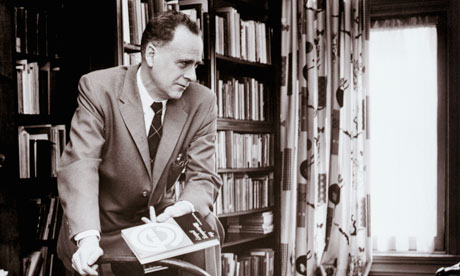I use a TV clip in my Media and Popular Culture class from The Office. It’s a scene in a car with Michael and Dwight on an ill-fated business trip. They’re struggling to interpret the voice from Michael’s GPS navigation system giving them turn-by-turn directions. The result is hilarious:
I use the clip to make a general point that someone’s map of reality is not the actual territory. However, the scene more directly illustrates Marshall McLuhan’s fourth law of media: “Reversal.”
 Three of the four laws of media (summarized here) are fairly easy to understand and observe. A new medium or technology “extends” some human sense or ability, while it “obsolesces” or pushes aside the old condition, and “retrieves” or recalls some old way of doing something within the new. Voice navigation GPS, for example, extends the visual sense of map reading to the auditory realm (we hear it). While it quite obviously obsolesces physical maps, one could also say it retrieves the idea of a flight navigator (WW2 bomber personnel included a navigator to read the maps and verbally guide the pilot to their target).
Three of the four laws of media (summarized here) are fairly easy to understand and observe. A new medium or technology “extends” some human sense or ability, while it “obsolesces” or pushes aside the old condition, and “retrieves” or recalls some old way of doing something within the new. Voice navigation GPS, for example, extends the visual sense of map reading to the auditory realm (we hear it). While it quite obviously obsolesces physical maps, one could also say it retrieves the idea of a flight navigator (WW2 bomber personnel included a navigator to read the maps and verbally guide the pilot to their target).
The concept of “reversal” has always been the most interesting to me among McLuhan’s tetrad, revealing what are often the unanticipated, negative effects of a medium.
“When pushed to the limits of its potential, the new form will tend to reverse what had been its original characteristics. What is the reversal potential of the new form?” – Marshall and Eric McLuhan, 1988.
The clip from The Office begins to give us some indication of what occurs when there is an overreliance on a single medium of information. Michael clearly ignores placing what he’s hearing in the spatial context around him. He discounts his own sense of sight and drives his car into the lake, over the loud protestations of Dwight who is desperately trying to interpret the GPS voice commands in combination with his visual sense of their surroundings.
What is fascinating is how far these reversal effects may reach with regard to human thought.
In The Glass Cage technology writer Nicholas Carr takes a close look at research into the reversal effects of GPS navigation technology. Carr cites 2013 research from György Buzaki and Edvárd Moser published in Nature Neuroscience that shows evidence for how the same neuronal mechanisms that help us comprehend spatial relationships may also be involved with how our brains process and make “associations among objects, events and other types of factual information.” The researchers speculate that this could constitute the core element in how people form memories.
Carr goes on to cite other research that indicates the deleterious effects of our reliance on GPS navigation are not dissimilar to what occurs with those afflicted with Alzheimer’s disease, where brain deterioration is observable when victims literally forget where they are. Véronique Bohbot, memory researcher from McGill University, argues that people must use it or lose it in terms of their brain’s navigational abilities. “Should the hippocampus begin to atrophy from lack of use in navigation, the result could be a general loss of memory and a growing risk of dementia,” according to Carr’s summation of Bohbot.
“The labors our obliging digital deities would have us see as mere drudgery may turn out to be vital for our fitness, happiness, and well-being.” – Nicholas Carr
With memory formation, and hence learning, clearly at stake, it’s not too much of a leap to see how this impacts another technological extension: the e-reader.
A 2013 article in Scientific American brings forth strong evidence that the act of reading taps into these all-important spatial circuits in the brain:
“Beyond treating individual letters as physical objects, the human brain may also perceive a text in its entirety as a kind of physical landscape. When we read, we construct a mental representation of the text in which meaning is anchored to structure.” – Ferris Jabr
Much like the reversal inherent in GPS voice navigation, reading from an e-reader makes it more difficult to harness and develop these elements of the brain.
“Most screens, e-readers, smartphones and tablets interfere with intuitive navigation of a text and inhibit people from mapping the journey in their minds.” – Ferris Jabr
Research is suggesting that e-reader technology needs to develop further along the lines of cognitive mapping, lest we throw out the new technology altogether. As one of my colleagues mentioned recently, there is no substitute for being able to tap into thousands of book titles when you’re traveling—especially on extended journeys.
 Far from dropping of a cliff, consumer research indicates hard copy books sales are resurgent—so much so that Amazon is dabbling in operating physical book stores. Like the resurgence in music recorded on vinyl records attributed to sound quality and the listening experience, people are responding to the physicality of the printed medium in ways not anticipated, leading to important ramifications for publishers, retailers, technology companies, and most importantly, readers.
Far from dropping of a cliff, consumer research indicates hard copy books sales are resurgent—so much so that Amazon is dabbling in operating physical book stores. Like the resurgence in music recorded on vinyl records attributed to sound quality and the listening experience, people are responding to the physicality of the printed medium in ways not anticipated, leading to important ramifications for publishers, retailers, technology companies, and most importantly, readers.
